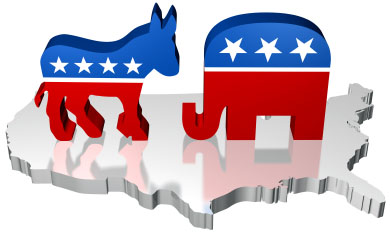 Paul Waldman asks us to imagine what’s going to happen the next time there’s some kind of Islam-inspired terror attack on American soil:
Paul Waldman asks us to imagine what’s going to happen the next time there’s some kind of Islam-inspired terror attack on American soil:
The news media would amp up the fear to levels we haven’t seen in the last decade, encouraging everyone to look for sleeper cells lurking down at the Piggly Wiggly. Republicans would of course unite behind President Obama in our time of mourning—kidding! They’d go on TV to denounce him for being so weak that the evildoers struck us in our very heart, and proclaim not only that the blood of the victims is on the hands of every Democrat, but that more attacks are coming and we’re more vulnerable than we’ve ever been. Dick Cheney would emerge snarling from his subterranean lair to warn us that this is only the beginning and we really need to start bombing at least five or six more countries. Senator Lindsey Graham, who has already said about ISIL that “this president needs to rise to the occasion before we all get killed back here at home,” might just tear off his shirt and scream, “We’re all gonna die! We’re all gonna die!” right on Fox News Sunday.
Now bear with me a for a moment. Here’s a seemingly unrelated story about Sam Brownback’s effort to spur economic growth in Kansas by lowering taxes on the rich and cutting back on welfare:
As he runs for reelection, Brownback is finding that what he once called a “real live experiment” in red-state governance is struggling to produce the benefits he had promised….In an interview on his way to Dodge City — where he would sign legislation creating a “National Day of the Cowboy” — Brownback said he regretted referring to his plans as an experiment. But he defended his tenure, saying it represented a Ronald Reagan-style approach to governance that eventually would rebuild Kansas’s economy after a long slide.
“I wish I could take that back, because I don’t consider this an experiment,” he said. “So many people on the left really want this to fail. . . . This is a long-term strategy to make us more competitive.”
Democrats and Republicans are both good at some things and bad at others. One of the things that Republicans are good at is making—and repeating over and over and over—firm predictions about the outcomes of their policy preferences. If you fail to wage eternal war in the Middle East, there will be a terrorist attack in the United States. If you lower taxes, the economy will improve. Etc.
These are easy things to understand for voters. And guess what? Eventually there will be a terrorist attack. Eventually the economy will improve. So when those things happen, Republicans have a nice, simple story already planted in the public mind that allows them to take credit or place blame for it.
Democrats are not so good at this. President Obama fumbled last night on 60 Minutes when he tried to take credit for the improved state of the economy compared to when he took office. Partly, of course, this is because the economy is only in so-so shape. But it’s also because Democrats have no simple, pre-digested narrative. They never said—over and over and over—that if we passed a stimulus bill, the economy would improve. Or that if we rescued GM, the economy would improve. Or that if we raised taxes on the wealthy, the economy would improve. Instead, Democrats had sort of a dog’s breakfast of policy choices that they endorsed, but never made into a centerpiece of a claim about economic recovery. So now, when the economy is recovering, nobody really gives them any credit.
Now, this may be a more honest way of conducting our affairs. Most government policies really do have only a modest effect on economic growth. Likewise, most government policies have only a modest effect on the chances of someone eventually pulling off a terrorist attack. But honest or not, it means voters don’t associate Democrats with much of anything. They don’t give them credit for improving the economy, for example, or for preventing terrorist attacks. And honest or not, it’s political malpractice.















